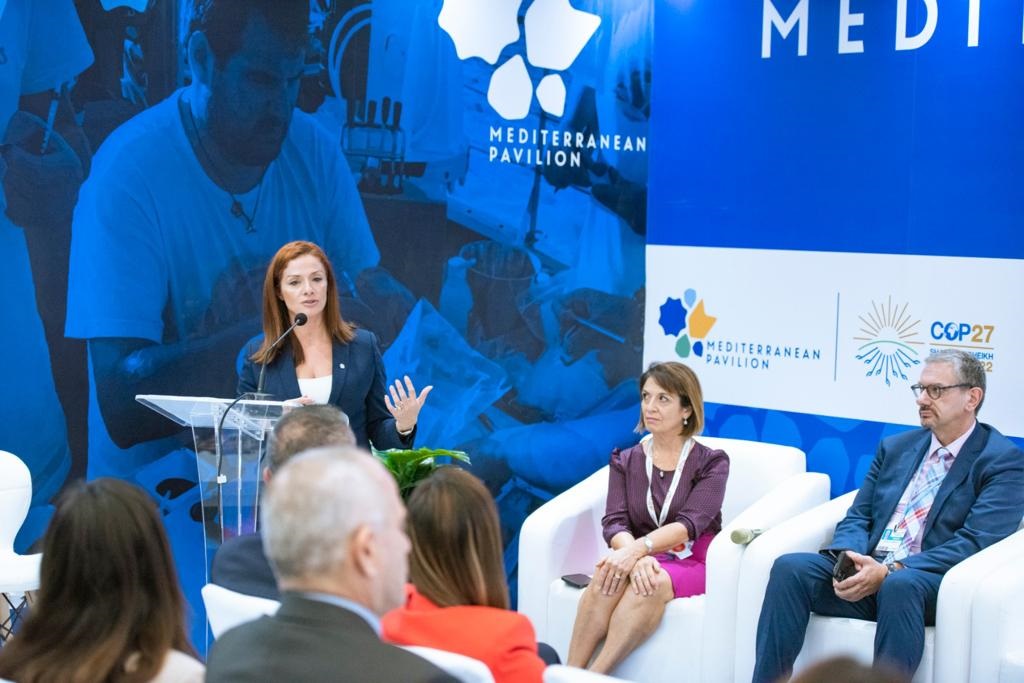Although the inclusion of environmental, social and governance (ESG) reporting and measures may come at a cost to companies, they are not without their benefits, with Malta’s ESG portal showing that Maltese companies who are incorporating such criteria in their business model are not only contributing to the fight against climate change but are also reaping financial benefits.
This data shows that companies investing in ESG Criteria have registered a 31 per cent decrease in water consumption, nine per cent decrease in waste generation and eight per cent less in CO2 emissions.
Minister for the Environment, Energy and Enterprise Miriam Dalli announced this data whilst delivering a keynote speech during the Climate Resilient Tourism in the Mediterranean conference during COP27 in Sharm El Sheikh. This conference focused on climate change initiatives in the Mediterranean.
The Energy and Water Agency, together with the Global Water Partnership – Mediterranean and the Union for the Mediterranean, co-hosted this conference with the support of Professor Simone Borg, Ambassador for Climate Action.
The speakers presented solutions to support the private sector, particularly the tourism sector, to become more climate resilient and sustainable by focusing on the direct link between water and energy.
With temperatures rising 20 per cent above the global average, the Mediterranean region is strongly feeling the effects of climate change. As a major economic contributor, the tourism sector inevitably causes pressure on any country’s infrastructure, including its energy and water resources.
“The private sector, including the tourism sector, has great potential to continue developing into an environmentally and economically sustainable sector. The business sector is an extremely important partner in our transition towards a climate neutral economy by 2050. Hence, why the government is supporting businesses who are becoming more environmentally sustainable. Likewise, we want to continue supporting research and innovation and allow innovative ideas to flourish and grow,” Minister Dalli said.
Minister Dalli emphasised that it pays to do good for the environment; “With solutions that can increase energy efficiency, water efficiency and waste reduction, and innovative actions help businesses maintain profitability whilst doing good. Malta is providing incentives to those companies investing to ensure sustainability and reduce their carbon footprint. Pushing forward ESG Criteria to be included in board decisions can and will take us a long way.”
The Energy and Water Agency explained how a pilot project it launched targeting guesthouses seeks to provide support in energy and water management. The assessment will help identify improvement opportunities.
On the margins of COP27, whereby countries come together to take action towards achieving the world’s collective climate goals, Minister Dalli also held a number of bilateral meetings with Egypt’s Minister of Petroleum and Mineral Resources, Tarek el Molla, Egypt’s Minister of Electricity and Renewable Energy, Mohamed Shaker El-Markabi, and the Minister of Water Resources and Irrigation, Hani Sewilam.
“Egypt and Malta share many similar realities when it comes to climate adaptation. Renewable energy systems, greener sources of energy and battery technology are areas of interest for both sides, and we look forward to further cooperation on this,” stated Minister Miriam Dalli.
The Minister also held a bilateral meeting with Chris Bowen, the Australian Minister for Climate Change and Energy.
Employers take umbrage at video promoting public sector’s flexible work arrangements
The video outlines a range of flexibility options available to public sector employees
Malta’s inflation eases to 2.5% in January as food prices remain main driver
While overall inflation continued to moderate at the start of the year, price pressures remain uneven across categories
Final call for food and beverage manufacturers to exhibit at SIAL Paris
SIAL Paris is one of the world’s leading international food and beverage exhibitions






